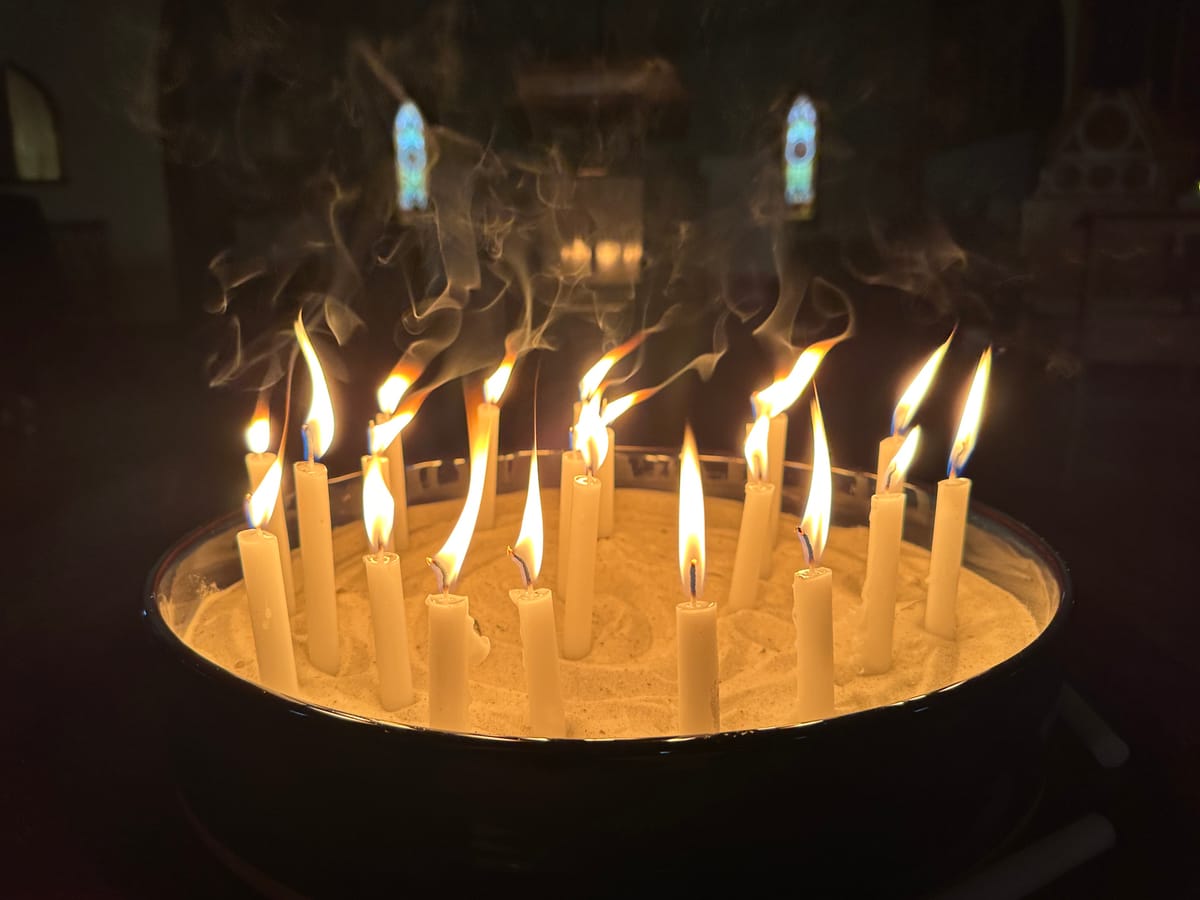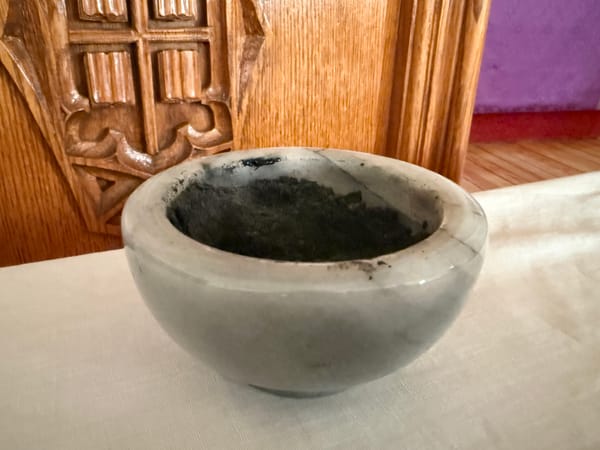Dreams of Light Rising in Darkness
The mess of this world should break all of our hearts, but what we have in Isaiah, in Jesus, is a reminder that God has far better dreams for us.

August 24, 2025 - The Eleventh Sunday after Pentecost
My friends, I speak to you today in the name of one God, Father, Son, and Holy Spirit. Amen. Please be seated.
Good morning, Epiphany. It’s good to be with you this morning. They say to preach out of your lived experience. Some of my most-appreciated sermons so far in my time here at Epiphany have been the ones that have shared a little bit about my personal life, or at least the ones that have reflected on the previous week here as your rector. Well, this one is going to start with a little too much information, a bit of TMI, but I hope you’ll stick with me through the introduction. You see, Abbey and I... we have a really terrible bed.
We bought our bed as a pandemic present to ourselves on our ninth wedding anniversary. It's a queen-sized mattress, a Serta iSeries hybrid. The mattress itself is fine, a bit firmer than we planned on getting, but somehow over the course of our move to Michigan, it developed a divot, maybe a broken coil or two in one specific spot. That spot has now grown to the size of a softball. I haven’t slept very well for weeks now. This isn’t the case of a “princess and the pea” scenario, it’s more like a “priest and the moon crater” story.
I’m telling you this this morning because it is definitely my lived experience of this week, the context in which I am approaching the lectionary text today, the Old Testament, Hebrews, and the Gospel. Each of us here has our own lived context when we come to church, and each preacher does too. That’s part of what makes AI or downloadable sermons so offensive to me: our job is to connect our real world, your real world, with the text, with the good news. Now, I’m pretty sure the divot is growing, and it has reached a crisis stage; we’re definitely going to buy a new mattress during these Labor Day sales. But what that crater in the mattress has provided for me over each of the last four nights is some pretty wild dreams. I’ve found that, for me, when I’m not quite in a deep sleep, the dreams become more vivid, more memorable. I wake up and feel like they were real.
I also heard a few lectures on dream interpretation while in graduate school for counseling psychology. Those lectures talked about keeping a dream journal, writing your dreams down as soon as you wake up, otherwise you’ll forget them. It’s an interesting practice, one I recommend you try, but this morning, I want you to put your therapist hat on and dive into my dreams with me. This is a bit vulnerable, please don’t worry about me too much. This is a sermon for you, for all of us, not a chance to dive into your priest’s well-being, though I know some of you fixers will still try to do that anyway. Thank you, but stay with me. I promise to tie into the good news in a minute.
Okay, therapist hats on? I hope this is fun. My first dream, from Wednesday night... I walk into church, here into the nave, and instead of our floor being finished, sanded and stained, a little bit darker than we wanted as we have it here this morning, instead of that, our flooring guys painted a big black circle right in the middle. I couldn’t believe it. I couldn’t stand it. Everyone told me it would be fine, but I knew they were lying. There was nothing I could do. I wake up. Next dream, Thursday night: I’m in my home office and our very large, full, impossibly heavy bookshelf starts to fall on me. I scream for help, it’s crushing me, but Abbey is on the phone and can’t hear. I fall to the ground. Jane comes in and sees me crushed, broken, and then she runs for help. I wake up. (I held that dream against Abbey after I woke up for a few hours. Ha.) Two more. Friday night: I’m leading a Sunday morning service and I realize the bulletin is wrong, and somehow a children’s program is going on back here and in the aisles, and I can hardly follow the service myself, so I scramble to find the Eucharistic Prayer, and it’s a new one I’ve never seen before, and it keeps calling God “Comrade.” I apologize to everyone, but it’s all a mess, and people begin to leave. I wake up. Finally, last night, this morning, spider aliens have taken over the country, and as I flee for the coastline, one gets me, and I die. Ugh. Maybe not the most relevant, but I can still see those spider aliens this morning.
So, are you worried about me yet? Or just hoping I get this bed thing fixed soon? Don’t worry, we’re taking a brief vacation next weekend, we’ll get a new bed, and I’m going to be okay. I bring all of these dreams and the obvious stress and anxiety held within them in part as a public confession to you, our church, that I am not immune to the stress and anxiety of the world around us. That stress works itself out in dreams around my lived context; don’t worry, I’m not worried about Epiphany, but I do read the news. The stress and anxiety there, for anyone with an ounce of empathy and compassion, is unescapable.
Abbey and I made a list this week of all the things that seem to be falling apart, things outside of our control. I won’t give you our full list here, because you probably know some of what’s on that list. Not just probably, I know you do, I have conversations with many of you every week, and I know what is on your own lists of stress and anxiety. Much of it is fully justified. Even though South Haven is a beautiful place to live, even though the summer here at Epiphany has been wonderful, even though we in this room have so much to be thankful for... the world’s democracies seem to be crumbling; our bodies are all aging faster than we want them to; technology is advancing beyond our control; our friends and family are sick and they are dying and we cannot stop it; greed and violence and injustice, we cannot end them... it can all seem like too much to bear.
When I am overwhelmed, like many of you, like many throughout history, I turn to God. Our Wednesday night Evensong has been a grounding, palate-cleansing, foundational part of my week and an important part of my walk with God since we started holding the service here three months ago. Last week, we read Psalm 10 together, which starts like this, “Why, Lord, do you stand far off? Why do you hide yourself in times of trouble?” Then it continues, “Arise, Lord! Lift up your hand, O God! Do not forget the helpless... you hear the desire of the afflicted, you encourage them, and you listen to their cry.” Over and over as you read the entirety of the Bible instead of cherry-picking texts that prove your already held political beliefs or that give you a reason to dismiss the whole thing, over and over you find a people crying out to God and you find a God who cares for the oppressed, a God who is love, who loves everyone and urges us to do likewise.
Today’s lectionary is no different. In the Gospel story, we find Jesus loving abundantly and healing a woman who was unable to stand up straight. The religious leaders were upset by this, telling people to follow their religious rules, but Jesus points out their hypocrisy, begging them to see a better way, one full of grace and love. And “when he said this, the entire crowd was rejoicing at all the wonderful things that he was doing.”
This familiar call to serve, this call for grace, this call to break down any barrier that we might put in the way of love, it is not just found in the New Testament. This is the story of God’s interaction with the world. Much of the Old Testament is dismissed by those who ignore the prophets. Without them, the God of Israel seems to take sides, to have established strange, strict rules. But the prophets bring the word of God, the character of God, to a wayward people. It is a shame that we often ignore what they have to say.
Isaiah, our Old Testament prophet for today, he exposes empty religious practices and shallow worship, like keeping a Sabbath at the expense of the needy and the sick, like posting the Ten Commandments but hating your neighbor who looks or loves or believes differently from you. In the verses preceding our lectionary reading, Isaiah delivers this message for God. It’s lengthy, but it is needed context for today’s reading: “For day after day my people seek me out, they seem eager to know my ways, as if they were a nation that does what is right and has not forsaken the commands of its God... yet on the day of fasting, you do as you please and exploit all your workers, you fast only to quarrel and to fight and to strike others with a wicked fist... is not this the fast that I choose, to loose the bonds of injustice, to undo the straps of the yoke, to let the oppressed go free? Is it not to share your bread with the hungry and bring the homeless poor into your house, when you see them naked, to cover them and not to hide yourself from your own kin?” That last line is a condemnation straight out of this week’s headlines; let us have ears to hear.
Then after this opening call, Isaiah continues with our text this morning, the promises of what living a life of love and grace and justice may bring. “If you offer your food to the hungry and satisfy the needs of the afflicted, then your light shall rise in the darkness and your gloom be like the noonday. The Lord will guide you continually, and satisfy your needs in parched places, and make your bones strong; and you shall be like a watered garden, like a spring of water, whose waters never fail. Your ancient ruins shall be rebuilt; you shall raise up the foundations of many generations; you shall be called the repairer of the breach, the restorer of streets to live in.”
Friends, the world is a mess. It always has been, but maybe we are witnessing and experiencing the mess ourselves more and more lately. The stress and the anxiety from that mess disrupts even your priest’s sleeping hours; the mess of it all can and should break all of our hearts. But what we have today in Isaiah, what we have in the example of Jesus, is a reminder that God has far better dreams for us than this mess we’re living in.
God does not want us to remove the homeless from our streets by throwing them into jail. God does not care for pious language or worship that is not accompanied by care for the poor. Social justice cannot be separated from the love of God because it is the very love of God worked out in us today. God wants us to share our bread with the hungry and bring the homeless poor into our homes. And if we do, if we satisfy the needs of the afflicted, then our light shall rise in the darkness and our gloom will be like the noonday.
This time in history may feel like a parched time, a stressful time, an unjust time, but thanks be to God that we have a God who cares, who emphasizes love at all costs and in all situations. In following that God and the way of love, may we all find our light rising in the darkness, and may we all find the rest and the peace that we need.
Amen.




